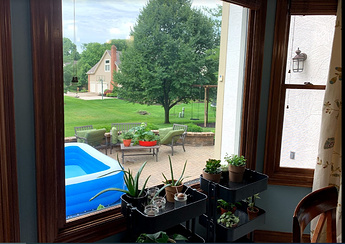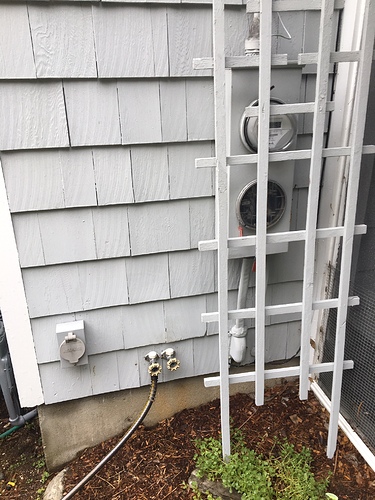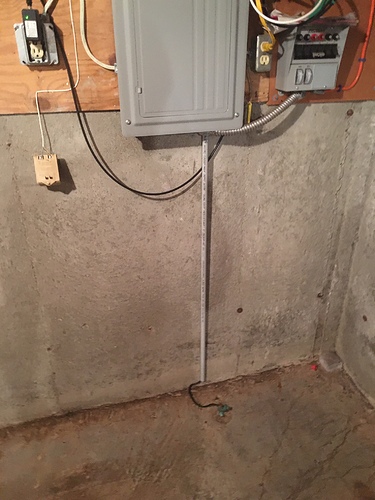They all appear painted, so I guess wood casement it is.
Consciousness building is not easy. This job is not going to be done as a worker cooperative, but negotiations haven’t been totally unproductive.
Opinions on what follows anyone? (and @Sabo and @catfacemeowmers and @bobman0330 because I want some horizontals, lawyers, and tax/businessman opinions here if possible as well)
Partnership structure where people have equal shares of ownership and there’s a contract between partners where money is divided up into 3 tranches: work, ownership, reserves. Each job has it’s own accounting where profit is divided up into those areas. The “work” area is hours of work and that portion is used to calculate $/hr. The profit from each job is then divided up, some for your share in the company, some for the hours spent on that job, and some towards operations or w/e that is not job-specific.
My question is, does this make anyone an employee? Does the company need to do payroll for the “work” portion? Does anyone need to be covered by workers’ comp?
I don’t know whether or not the specific percentages matter, but my first though is “work” is 70% or so.
(note: I don’t really want to be doing kitchens and bathrooms so I almost certainly should be punting on this. note note: the other people involved here have been doing kitchens and bathrooms and general remodel for a long time and I’ve worked with them a lot, so it’s not like insane or anything.)
Thanks for the responses, everyone.
Mostly double-hung windows (I think?), a few fixed. Here’s an example from our kitchen:
This is a reasonable question. I believe a lot of them have lost their seals, based on the condensation we can see between the panes and the frost we see during the winter. That being said, I think we’ve probably also been influenced by a number of our friends who have recently replaced theirs. As is probably obvious, I’m a complete moron when it comes to home items like this, so I’m inclined to think “Oh, friends X Y and Z have replaced the windows in their similarly-aged homes, must be about time for us.”
The rep we had today was only offering replacement windows - they don’t do new construction windows. We’ve had no water issues that I know of and I don’t think we’ve had drafts around the windows. (If I implied that before, I didn’t mean to.)
A real problem is that actually replacing these things is likely to generate an explosion of other desires in terms of matching trim around the house. Mrs. Spidercrab would love to replace our brown wood trim with white trim, and I can envision a world where we get white vinyl windows that ends up “necessitating” a full trim refinish.
Yeah, that picture makes me think getting a beer and hanging out in the inflatable pool > replacing the windows.
Strongly agree with JT and micro here. Those are not the windows I was expecting to see based on your description, and there should be no reason to replace them. You can get the insulated glass units with bad seals swapped out for a fraction of the cost, and any opening/closing issues should be solvable. Draft problems will take a good carpenter if it’s lack of insulation behind the casing.
Hunt around. There’s probably a good window repair person somewhere near you. I’d start with the glass shop like I mentioned above for Melkerson. If they can’t do it they’ll know somebody who can.
A few comments off the top of my head…
-
Contracting generally needs licenses in CA. Somebody, or some legal entity, should hold such licenses. Contracting implies making legal contracts. Again somebody or entity needs to be able to do that.
-
A recent law in CA facilitates worker collectives, coops, and ESOPs. I know of this (only) because of our research during the transition from 2+2. You’d want to do use the ‘collective’ form option. A source: Worker Coops | California.
-
You wouldn’t generally be signing contracts among yourself. Also IDK if it makes sense locking in %s like that in general, as opposed to doing things case-by-case. Instead, such decisions would be part of the by-laws/charter/etc, or recorded in the minutes of the board meetings/etc.
-
As we both suggested during that same transition, it’s not necessary to cross all the legal i’s, and dot all the legal t’s, before starting up. If, say, somebody (you?) have the above licenses, and were already in business generally, you folks could work under that umbrella… with perhaps unsigned or signed agreements in this transition period… really until there are profits to disburse. Since they say most startups fail, that can save a lot of busy work when that’s what happens.
-
I’m not a lawyer, so LOL @ anyone taking my advice on anything legal. Regarding workers comp… I’d check with a real lawyer website, and the state website, at the very minimum.
Partners (or members of an LLC taxed as a passthrough) are never employees of the partnership for tax purposes. Instead, they get a K-1 at the end of the year that shows their partnership income. The partnership isn’t required to withhold income taxes/FICA. Instead, the partners pay estimated taxes that include their income from the partnership.
The work part is potentially tricky. You don’t want the work credits to constitute a “guaranteed payment” for tax purposes, because you don’t get the 20% QBI deduction on guaranteed payments, but you do get it on allocations of net business income (subject to various other limitations). A guaranteed payment is generally a payment that isn’t based on the partnership’s income, although the specific boundaries of the definition are a bit hazy. You’d need to get into the weeds to figure out if you can redo your work allocation to function as an allocation of the partnership’s income rather than a fixed $/hr rate.
Perhaps not clear, but I was figuring you’d have some percentage of each job’s profit go for work. If there are 200 person-hours in the job and the profit to be directed towards work is $8k, then the work is paid $40/hr. But, there’s no guaranteed rate. If there’s no profit on a job, there’s no money paid for work.
Yeah, I don’t think all the i’s need to be dotted and t’s crossed for the first job done this way, but I the plan has to be feasible. If there’s any hope of this happening (and I’m not 100% sure I want it to), I think it will only happen if we more or less work out the splitting arrangement during this job we’re doing and then at the end I can show people they would have made more money the other way. Even then, not sure they’d go for it. I tried to partner with a guy who worked for me before, we did one job as partners, he made a fair amount more than he would have otherwise made, but afterwards decided the uncertainty wasn’t worth it.
I would not replace those windows. Zikzak is spot on with the other info he gave.
I have an AC condensate pump that sits lower than the outside dump tube so almost all of the water it tries to pump out gets siphoned back in. Can I just put a check valve in the line or will that not work? I’ve seen more complex anti siphon valves with vents talked about but can’t find any actual examples to buy.
seems like a check valve ought to work, maybe the swing check-style instead of the spring-loaded. what is the tubing like that connects to the pump? is it rigid pvc pipe or some flex, translucent-type tubing?
Thanks. It’s a 3/8" plastic tube.
You’d just have to locate an appropriately-sized check, I guess, and some of those ribbed inserts that could be received by the tube and additionally fastened with hose claps to transition from tube to check and back again, perhaps. Engineer something lol that’s the fun stuff!
Unfortunately I don’t have any answers for these questions beyond agreeing w/ Bobman that partners are not employees. I’ve never done much employment law beyond employee side wage claims.
I think something you should consider if you move forward with this is having terms in place ahead of time for buying out partners. It sounds like for every job, each partner will collect something regardless of the work they do based on their share in the company, and then everyone gets paid their slice of the “work” pie based on how many hours they spent on the job.
What happens if in six months one of the guys decided they don’t feel like working with you anymore and stops showing up, but continues to collect their ownership share of every job? Or sends a subcontractor out to do their “work” share? I’m not sure that would be a breach of the lazy partner’s fiduciary duties. Seems like you might want a mechanism where the other partners can agree to buy out that partner’s share using a predetermined price formula.
If I have some time later today I’ll poke around on lexis and see if I can get an answer on worker’s comp.
This isn’t improvement, but I need some advice -
Had a large thunderstorm in our area last night, it wasn’t right overhead, it was a bit to the north. I was sitting on my porch reading and out of the corner for my eye I saw three quick flashes of electricity where the electrical enters the house, and a sound kind of like “zit zit zit” like you’d imagine electricity sounding like, then the sound of a thunder boom nearby (but not right over us). I saw no damage in the area, I went downstairs to the basement for the fuse box and saw nothing, every appliance works, I went all over the house and saw no damage, no smells of anything burning. Could lightning have hit near by and what I saw was just a discharge of that, and it’s a normal thing, or is this something I should freak out about, even without visual evidence of any damage?
First pic is where I saw the flashes, where the electrical enters the house, then the second is my fusebox and what I assume is a grounding wire. Maybe the hose was an issue? Thanks for any help/advice, I know nothing.
Anyone subcontracting anything without at least majority approval, if not unanimous, will not be allowed. Some kind of buyout for sure, but it’s hard to foresee any situation where there’s any significant problem like that that doesn’t cause the total dissolution of the enterprise.
The bottom picture is the ground (the green thing is a copper clamp, right?).
There’s not a lot of lighting where I am, so I don’t any relevant experience, but I think it’s common and usually doesn’t cause damage. If everything seems to work, then don’t worry. I guess electronics (TV or whatever) are the most likely things to be damaged.
Thanks - yeah it looks like the ground to me, and is copper. I appreciate the advice to not worry, I think that’s what I’ll do since there looks like no damage. Just alarming to see visible electricity.
Does anyone have any experience with either Ring or Simplisafe? We’re (fingers crossed) closing on a house in two weeks and are looking into the DIY setup security systems. I’ve read plenty of reviews and watched youtubes etc, but I’m looking for real life reviews from people that I trust with no agenda.


